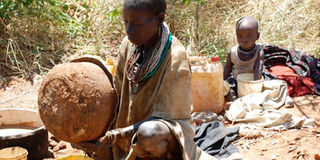Karamoja artisanal miners bite the dust over Covid-19

Ms Mary Putan searches for gold in Rupa Sub-county in Moroto District last week. PHOTO | STEVEN ARIONG
What you need to know:
- Coverage. Chepkararat Mining Site in Amudat employs more than 170 small scale miners. Artisanal and Small-Scale Mining provides livelihoods directly and indirectly to about 50 per cent of Karamoja’s population, which has persistent levels of informality and comprises around 25,000 people mainly rural people, according to government data.
To meet the daily needs in life, one must do something that generates income.
Esther Heiza has to mine gold at Chepkararat Mining Site, Karamoja Sub-region to sustain her family.
However, she has been out of work since March when the government suspended gatherings and imposed a lockdown as a measure to stop the spread of Covid-19.
“We were many in this mine, but when the government stopped us from mining, some people, especially men managed to leave but many women stayed with their children,” Ms Heiza, an immigrant from Buikwe, says.
She is part of a group of 13 single mothers, who are stuck in the mines without a reliable source of food or even transport to go back to their villages.
“At first, we thought the lockdown would be for a few days, but even after easing it, you cannot travel. Transport is very expensive,” she adds.
About 50 miners, majority who are immigrants from Mubende, Busia, Kampala, Mbarara, and Buikwe districts, are stuck at Chepkararat Mining Site in Amudat District.
Those living with their husbands, are facing it rough.
“When you ask for food from your husband, he becomes violent because he does not have money to buy food. It is fighting all the time,” says Dianah Mbabazi, who hails from Mbarara.
Every day, Ms Mbabazi and Ms Heiza say they were assured of getting more than Shs10,000 from mines. This money would help them meet their daily needs.
Ms Deborah Ariong, the Amudat Natural Resource officer, said government has not rendered support to communities that depend on mining.
“And the natural resources sector is a very underfunded one. As a district, we have a meagre budget but we have a lot to do. Whatever little we get from the partners, is what we use to go and do community engagements, sensitisation and egal support to miners,” Ms Ariong said.
She adds that miners also need guidance, especially on the use of mercury in mines.
“Mercury is very dangerous to lives, communities, animals, and the environment. This is a pastoral area, but miners dig pits and they leave them open. Cattle and goats fall into these pits, and they die causing conflicts between miners and the communities,” Ms Ariong added.
She says they have carried out sensitisation about the dangers of mercury use in mines but miners say the alternatives are expensive.
Ms Ariong spoke on the side-lines of a visit by officials from the Ecological Christian Organisation, a civil society organisation, implementing the Karamoja Mining Governance Project funded by the Democratic Governance Facility.
The project seeks to promote good governance in the minerals sector in the Karamoja Sub-region.
Covid-19 has also delayed efforts to formalise mining in the area by both governments, and the civil society like Biometric Registration of ASMs (BRASM) launched in March 2019 by the Directorate of Geological Survey and Mines.
Ms Dylis Ndibaisa, the Senior Programmes Officer of ECO, said during their routine monitoring activities, they have realised some miners were violating the ban on mining activities, and many cited lack of alternatives to mining as the major driver.
Mining is being done by children as young as 10 years, Ms Ndibaisa said.
She, however, commended the government for making progress in mineral governance and transparency.
“But there is a need to consider artisanal miners in government priorities of economic recovery activities given the tremendous importance they have to their livelihoods,” she adds.
Mr Disan Ndooli, the chairperson of Chepkararat Mining Site, said: “When the district closed the activity as a means to fight Covid-19, some men left the mining site leaving behind their wives and children who are now suffering.”
He appealed to the government to allow the small and medium scale miners to continue operation.
Ms Dauphin Nishima, a mother of two, says her husband ran away after they had a quarrel over food.
“Life is becoming difficult every day that passes by, and children have become a burden instead of joy,” she adds.
Mr Patrick Musamali, a miner, says they were working for hand-to-mouth.
This is the reason, he says, many cannot even afford transport to go home.
He added that the district had given some relief food, but not all the affected people benefited.



